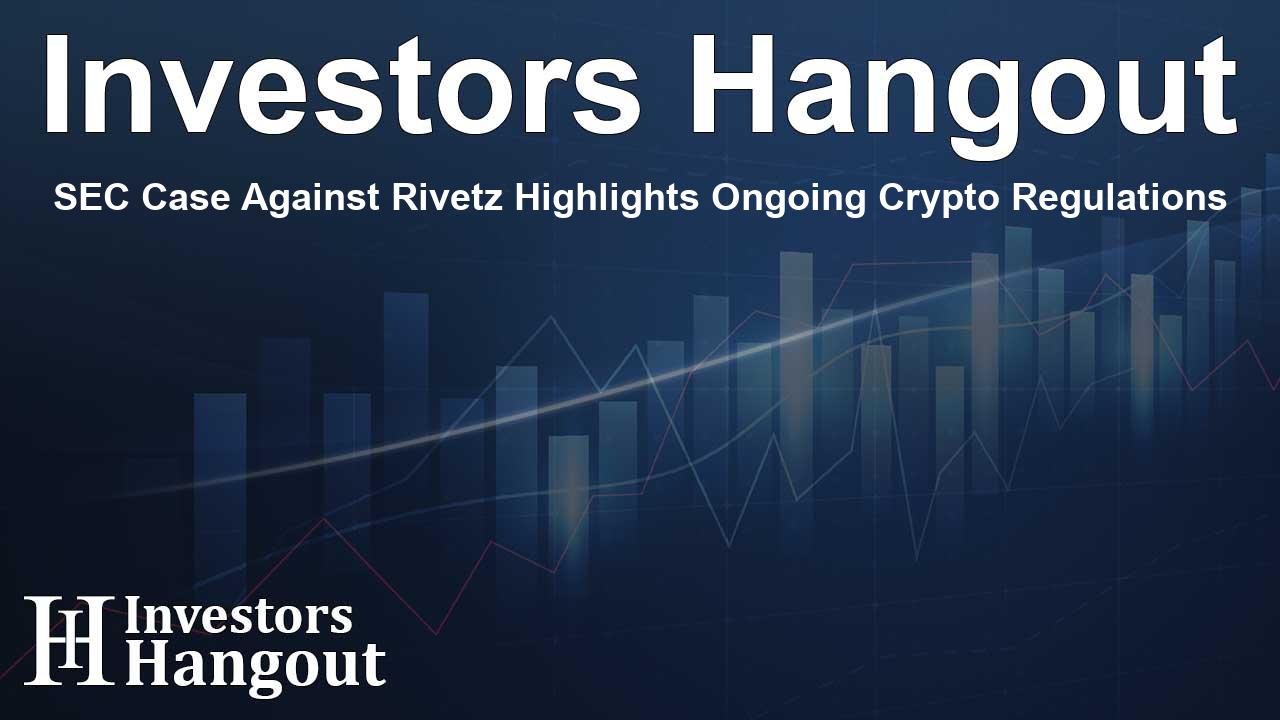SEC Case Against Rivetz Highlights Ongoing Crypto Regulations

Significant Legal Victory for the SEC in the Crypto Space
In a significant legal development, the Securities and Exchange Commission (SEC) recently secured a victory over blockchain firm Rivetz, which has been accused of engaging in the sale of unregistered securities. This ruling could have substantial implications not just for Rivetz, but for the entire cryptocurrency sector, highlighting the SEC's unwavering commitment to enforcing securities laws.
Overview of the Case Against Rivetz
U.S. District Judge Mark Mastroianni issued a ruling granting the SEC's motion for summary judgment. This judgment was handed down without the necessity for a trial and affirms the SEC's position in this matter. Following this decision, the SEC is preparing to engage with Steven Sprague, CEO of Rivetz, to propose a judgment that includes injunctive and monetary relief.
Allegations of Unregistered Securities
The roots of this case trace back to 2021 when the SEC accused Rivetz of failing to register its securities. The allegations centered on Rivetz's initial coin offering (ICO), which raised $18 million in 2017 for the Rivetz token. According to the SEC, this offering clearly violated the Securities Act, marking a pivotal point in regulatory scrutiny of cryptocurrency transactions.
Implications of the SEC's Vigilance
The recent victory against Rivetz highlights the SEC's heightened vigilance against cryptocurrency firms. Over recent years, several significant players such as Binance, Ripple Labs, and Coinbase have found themselves facing lawsuits and sanctions from the agency. This increased enforcement activity signifies a shift towards stricter compliance within the industry, which many firms are now grappling with.
Trends in SEC Enforcement Actions
In 2024 alone, the SEC has imposed record penalties on various cryptocurrency entities, amounting to an astonishing $4.68 billion. This figure represents a staggering 3000% increase from penalties assessed the previous year and reflects an aggressive regulatory stance aimed at ensuring firms operate within the confines of existing laws.
Industry Reactions and Commentary
The SEC's rigorous enforcement approach has drawn criticism from various corners of the cryptocurrency community. Prominent figures such as billionaire investor Mark Cuban have publicly expressed their discontent with the SEC's regulatory actions, criticizing the agency’s methods and calling for clearer guidelines. This sentiment is echoed by many industry advocates who feel the current regulatory landscape stifles innovation.
Political Ramifications
The Commission's approach has also seeped into political discussions. For instance, Republican presidential candidate Donald Trump has made headlines with his promise to fire SEC Chair Gary Gensler if he were to return to office. Such statements underline the contentious atmosphere surrounding cryptocurrency regulations and the potential for future shifts in policy.
The Path Forward for Rivetz and the SEC
As the SEC finalizes its judgment regarding Rivetz, the outcome of this case will likely serve as a precedent for future actions against other cryptocurrency firms. The decision not only impacts Rivetz but reflects how regulatory bodies are looking to govern the sector comprehensively.
Future of Cryptocurrencies Amid Regulatory Changes
The evolving landscape poses challenges and opportunities for cryptocurrencies and their advocacy groups. As the industry adjusts to increased scrutiny, many players will need to focus on compliance to navigate this enhanced regulatory environment successfully. How Rivetz and others respond to these challenges will shape the trajectory of cryptocurrency regulation.
Frequently Asked Questions
What was the ruling in the SEC case against Rivetz?
The SEC won a summary judgment against Rivetz, marking a significant step for the agency in enforcing securities laws within the crypto sector.
What are the allegations against Rivetz?
Rivetz was accused of selling unregistered securities during its $18 million ICO in 2017, violating the Securities Act.
How much has the SEC fined cryptocurrency entities in 2024?
In 2024, the SEC has imposed a record $4.68 billion in fines on various cryptocurrency entities, showcasing a significant increase in regulatory enforcement.
What is the significance of this legal battle for the crypto industry?
This case highlights the SEC's aggressive stance on cryptocurrency regulations and sets a potential precedent for how similar cases may be handled in the future.
How are industry leaders reacting to the SEC's actions?
Many in the cryptocurrency space, including prominent figures like Mark Cuban, have criticized the SEC's regulatory approach, calling for clearer guidelines to support innovation.
About Investors Hangout
Investors Hangout is a leading online stock forum for financial discussion and learning, offering a wide range of free tools and resources. It draws in traders of all levels, who exchange market knowledge, investigate trading tactics, and keep an eye on industry developments in real time. Featuring financial articles, stock message boards, quotes, charts, company profiles, and live news updates. Through cooperative learning and a wealth of informational resources, it helps users from novices creating their first portfolios to experts honing their techniques. Join Investors Hangout today: https://investorshangout.com/
Disclaimer: The content of this article is solely for general informational purposes only; it does not represent legal, financial, or investment advice. Investors Hangout does not offer financial advice; the author is not a licensed financial advisor. Consult a qualified advisor before making any financial or investment decisions based on this article. The author's interpretation of publicly available data shapes the opinions presented here; as a result, they should not be taken as advice to purchase, sell, or hold any securities mentioned or any other investments. The author does not guarantee the accuracy, completeness, or timeliness of any material, providing it "as is." Information and market conditions may change; past performance is not indicative of future outcomes. If any of the material offered here is inaccurate, please contact us for corrections.